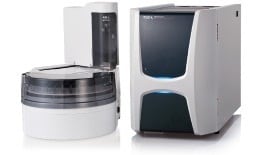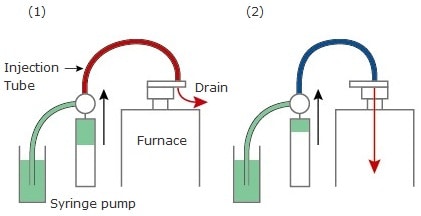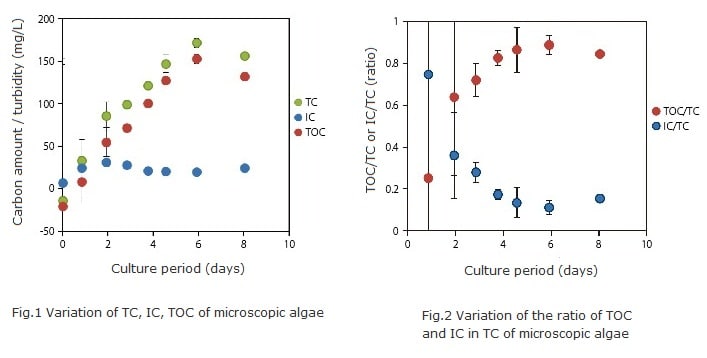TOC-L for Monitoring a Microscopic Algae Biomass

Biomass is considered a prospective new energy source. The dry weight method has been typically used to determine the amount of microscopic algae in biomass. However, Shimadzu proposes a new method, one that is rapid, easy, and accurate, utilizing the TOC-L total organic carbon analyzer.
The TOC-L series can accurately measure a variety of samples, even those containing suspended solids. This model improves on this capability through the development of a new sequence of the sampling and injection motion. This makes it possible to measure a sample that contains suspended solids that have higher sedimentation rates. Consequently, measurement of a highly suspended solution, such as fluid for microscopic algae biomass, without any pretreatment is possible. We proudly introduce this method as an epochal evolution tool that can replace the dry weight method.
Main specifcations
- Measurement range : TC 0-300mg/L (0-150mg/L for low concentration type), TN 0-100mg/L (0-50mg/L for low concentration type)
- Injection volume : 80μL (150μL for low concentration type)
- Recommended catalyst : TC regular catalyst or TC/TN catalyst
The sequence for measuring a high-suspension sample

- The sample is pushed out of the injection tube immediately after being transferred to the syringe pump. With this motion, injection tube is rinsed and filled with a highly suspended sample. (See red part of figure (1))
- Move the injection slider to the injection position, and inject the sample using the syringe pump. The injectio volume adjusts exactly to the inner volume of the injection tube (See blue part of figure (2)). This sequence enables precise injection of the entire sample in the injection tube to the furnace.
Example
Below is an example of measuring microscopic algae with medium culture as a high-suspension solution. Fig. 1 shows the TC, IC, TOC measurement results of microscopic algae, and Fig. 2 shows the ratio of TOC and IC in the TC of the microscopic algae. In both cases, the figures show trace results after an 8-day incubation. Though sample preparation, such as homogenizing, was not performed, stable and accurate results were obtained.*1)
The TOC-L makes it possible to observe the dynamic state of the carbon accurately and in real time. Plus, since it only requires a small sample volume (10-20mL), the TOC-L is best suited for lab-scale studies.

TOC-L can be utilized in following applications.
- Obtaining information about the characteristics of microscopic algae.
- Monitoring the behavior of microscopic algae cells in the cultivating process or in a contrasting environment.
- Understand quantitatively the carbon and nitrogen balance*2) in the culture system.
*1) Data provided by Prof. Shiroiwa, Tukuba Univ.
*2) The "TNM-L" unit is required for total nitrogen (TN) analysis.
Note:
We cannot prove that this model can measure "all" types of suspended solids in the sample. Depending on the characteristics of the suspended solid, sample pretreatment like dilution, fracturing, diverging, or agitating may be required. If you have any questions about the sample condition or the applicability of this model to your sample, please contact your Shimadzu representative.


